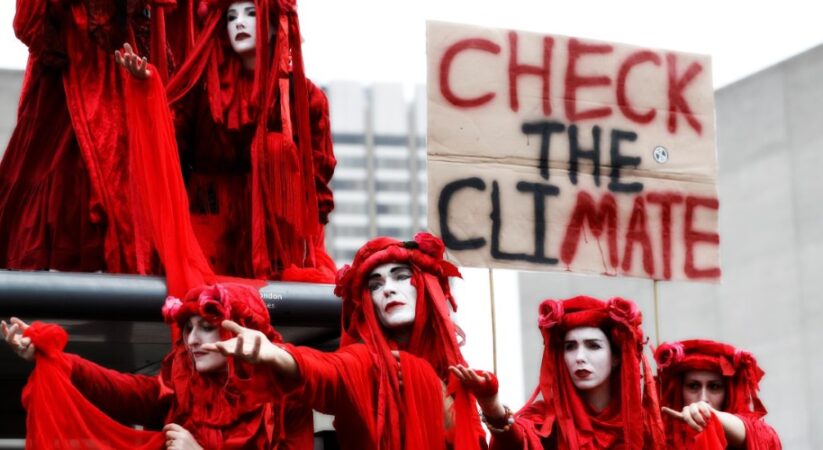The 50-page report—structured like the memos that prosecutors compile before issuing an indictment to assess whether there is a strong enough case to obtain and sustain a prosecution—details admissible evidence, possible charges, and legal issues pertaining to a homicide prosecution of Big Oil firms for their role in causing lethal heat waves, such as the one that blanketed much of the U.S. last week.
The prosecution memo, which was authored by a former prosecutor, a criminal law scholar, and other legal experts, analyzes whether prosecutors in Arizona could pursue reckless manslaughter or second degree murder prosecutions for deaths caused by the July 2023 wave, an extreme weather event that killed 403 residents of Maricopa County and that climate scientists concluded would have been “virtually impossible” but for human-caused climate change. Its authors stress that their conclusions are “broadly applicable to any prosecutor seeking justice for climate victims” and that similar charges could be pursued in “any jurisdiction that has experienced climate-related deaths.”
The memo provides an overview of the publicly available evidence that (1) Big Oil’s conduct in generating a substantial portion of all global greenhouse gas emissions and deceiving the public about the dangers of those emissions was a cause of deaths from the July 2023 heat wave, and (2) Big Oil engaged in this conduct with the culpable mental state required for a reckless manslaughter or second degree murder offense. The memo also assesses a range of likely defense arguments that the fossil fuel industry might assert in response to a prosecution—including blaming consumers, challenging causation, and asserting necessity—and discusses why none provides a complete defense to the charges.
Aaron Regunberg, senior policy counsel at Public Citizen and lead author of the memo, said, “As Americans reel from another lethal heat wave, it’s important to remember that these climate disasters didn’t come out of nowhere. They were knowingly caused by fossil fuel companies that chose to inflict this suffering to maintain their profits, while regular people, like the victims of the July 2023 heat wave, and of so many other climate disasters, pay the price. These victims deserve justice no less than the victims of street-level homicides. And this memo shows that prosecutors have a path to secure that justice, if they choose to pursue it.”
One of the memo’s co-authors, Professor Cindy Cho, served for over a decade as federal prosecutor, first as an Assistant U.S. Attorney and then as Chief of the Criminal Division for the U.S. Attorney’s Office for the Southern District of Indiana, where she prosecuted a wide range of cases—including public corruption, sexual exploitation of minors, white-collar crime, illegal opioid distribution, cyber crime, and criminal cases arising from the siege of the U.S. Capitol on January 6, 2021—and won multiple awards for her work, including a DEA Organized Crime Drug Enforcement Task Force National Award for Innovative Investigation Efforts for the prosecution of a dark web drug trafficking organization; a Food and Drug Administration Special Achievement Award for the prosecution of a drug manufacturing CEO; and an Inspector General’s Award for Excellence for the prosecution of a fraudulent nursing home executive.
Describing her work on the memo, Professor Cho said, “When someone causes suffering by breaking the law, good prosecutors know it is their duty to bring appropriate charges. Some of the very best public servants I’ve had the privilege to work with are prosecutors who embrace really tough cases because they can also be the most righteous cases. Although civil remedies are of course vital, sometimes only our criminal laws can measure up to the harm someone has inflicted. If human-generated climate change is killing people, and the organizations that generated it knew the risks, then it stands to reason that criminal charges may be exactly what society expects.”
Climate activist and author Bill McKibben said, “What’s happened to the climate is a crime: after fair warning from scientists about what would happen, Big Oil went right ahead pouring carbon into the atmosphere, and now there’s a huge pile of dead bodies (and a larger one of dead dreams). The only question left is whether our legal system will recognize these crimes—and this report shows there’s a good chance the answer could be yes.”






amoxil tablets – https://combamoxi.com/ order amoxil generic
can i buy ed pills over the counter – https://fastedtotake.com/ how to buy ed pills
prednisone canada – https://apreplson.com/ order deltasone 20mg for sale
meloxicam 15mg usa – swelling purchase meloxicam pill
purchase warfarin for sale – https://coumamide.com/ cozaar where to buy
oral nexium 20mg – nexium to us buy nexium 20mg pill
order augmentin 1000mg generic – https://atbioinfo.com/ buy ampicillin pills
buy azithromycin no prescription – order tinidazole 500mg online cheap bystolic 5mg drug
buy amoxicillin generic – valsartan 160mg generic combivent 100 mcg over the counter
buy generic propranolol – methotrexate price generic methotrexate 5mg
domperidone 10mg pill – tetracycline 500mg us buy cheap flexeril
semaglutide without prescription – order semaglutide 14 mg online cheap periactin 4mg
buy cheap zithromax – buy azithromycin flagyl uk
More posts like this would prosper the blogosphere more useful.
More posts like this would prosper the blogosphere more useful.
where buy cheap clomid pill where can i get clomid no prescription clomid challenge test buying generic clomid no prescription can i get clomid without rx buy clomid without dr prescription can i get cheap clomiphene without dr prescription